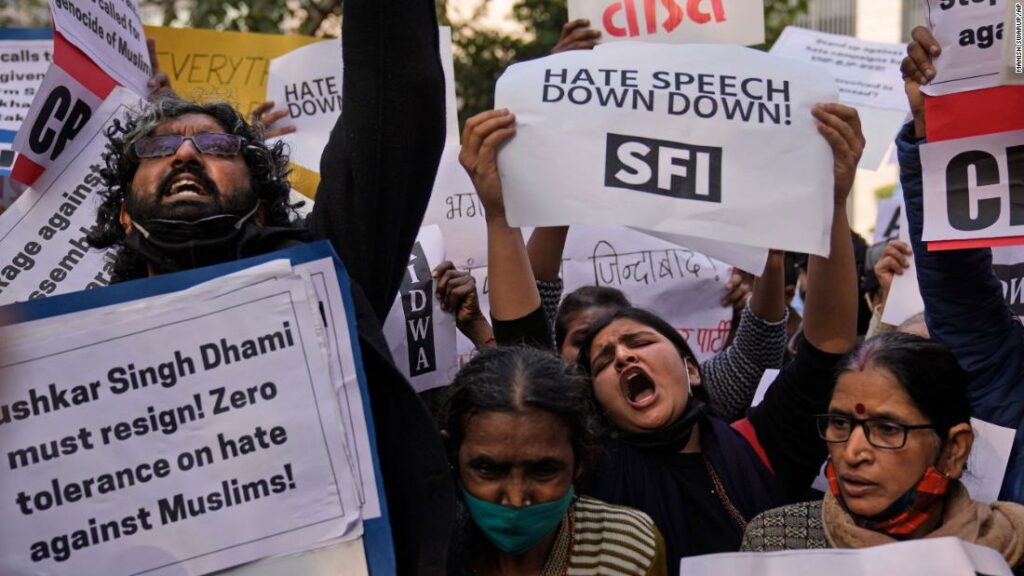India’s Hindu extremists are calling for genocide against Muslims. Why is little being done to stop them?

“If 100 of us become soldiers and are prepared to kill 2 million (Muslims), then we will win … protect India, and make it a Hindu nation,” said Pooja Shakun Pandey, a senior member of the right-wing Hindu Mahasabha political party, according to a Analysts say the Hindu Mahasabha is at the tip of a broader trend in India which has seen an alarming rise in support for extremist Hindu nationalist groups since Prime Minister Narendra Modi came to power nearly eight years ago. Although these groups aren’t directly associated with Modi’s Bharatiya Janata Party (BJP), his own Hindu nationalist agenda, and the lack of repercussions for these groups’ previous vitriolic comments, has given them tacit support, making them even more brazen, analysts say. Analysts fear this rise poses a serious danger to minorities, especially Muslims — and worry it may only get worse as several Indian states head to the polls in the coming months. “What makes the Hindu Mahasabha dangerous,” said Gilles Verniers, an assistant professor of political science at Ashoka University near India’s capital, New Delhi, “is that they have been waiting for a moment like this in decades.”Rise of the right-wing Hindu groupFounded in 1907 during British rule at a time of growing conflict between Muslims and Hindus in the country, the Hindu Mahasabha is one of India’s oldest political organizations. The group didn’t support British rule, but it didn’t back India’s freedom movement either, led by Mohandas Karamchand Gandhi, who was particularly tolerant of Muslims. Even now, some members of the group worship his assassin, Nathuram Godse.The Hindu Mahasabha’s vision, according to the group’s But according to Verniers, their “strength is not to be measured in electoral terms.” And in the past eight years since Modi came to power, they appear to have expanded in numbers and influence based on the size and frequency of their meetings, he said.While the group does not publicly disclose how many members it has, Verniers said they are “comfortably in the tens of thousands.”Hindu Mahasabha targets rural communities in northern states, where there is a large BJP presence, encouraging them to vote for parties that align with their Hindu-nationalist ideology, including Modi’s BJP, Verniers said. Modi, in turn, has Modi swept to power in India in 2014, promising economic reform and development for the country. But starting from his first term as Prime Minister, minority groups and analysts say they began to see a significant shift in India’s ideology from a secular to a Hindu nationalist state.The BJP has its roots in Rashtriya Swayamsevak Sangh (RSS), a right wing-Hindu group that counts Modi among its members. Many RSS members are adherents of the Hindutva ideology that the Hindu Mahasabha preach — to make India the land of the Hindus. In 2018, India’s current Home Minister Amit Shah said Muslim immigrants and asylum seekers from Bangladesh were “termites” and promised to rid the nation of them. The BJP’s Yogi Adityanath, the chief minister of the north Indian state Uttar Pradesh, known for his anti-Muslim views, once compared Muslim Bollywood superstar Shah Rukh Khan to Hafiz Saeed, the alleged planner of the 2008 Mumbai terror attacks, according to the Press Trust of India. Between 2015 and 2018, vigilante groups killed dozens of people — many of whom were Muslims — for allegedly consuming or killing cows, an animal considered sacred by Hindus, according to a report from Human Rights Watch. Modi publicly condemned some of the killings, but the violence continued, and in 2017, his government attempted to ban the sale and slaughter of cows –currently illegal in several Indian states — nationwide. All of this has only served to encourage extremist groups like the Hindu Mahasabha, say experts. Zakia Soman, a women’s rights activist and co-founder of the Muslim group Bharatiya Muslim Mahila Andolan, said “a failure of governance” had given rise to more right-wing extremists. “Our community is realizing that we have become second-class citizens in our own country,” Soman said. “Minority bashing and hate is becoming regular and normalized. As the intensity increases, the venom and violence in their language also increases.” A 21-year-old Muslim student in Delhi, who chose to remain anonymous for fear of backlash from right-wing groups, said Muslims are filled with “a sense of fear” every time right-wing Hindu groups make hateful comments. “It gives us a sense that we don’t belong here,” he said.The future of the Hindu-rightDespite police investigations and public outrage, legal action against those who spoke and were present at December’s event have been slow.In a letter submitted to Modi on Friday and seen by CNN, students and faculty of the prestigious Indian Institute of Management in Bangalore and Ahmedabad said his silence “emboldens” hate, adding there is “sense of fear” among minority groups in India. Some experts agree the government’s silence has only emboldened these groups further. “Hate speech precedes hate crimes,” Grover, the lawyer, said. “And we are witnessing a crescendo of hate crimes. These groups are rapidly spreading poison through society.” A 2019 US intelligence report warned that parliamentary elections in India increase the possibility of communal violence if Modi’s BJP “stresses Hindu nationalist themes.” It added that state leaders “might view a Hindu-nationalist campaign as a signal to incite low-level violence to animate their supporters.” The BJP — which rarely gives statements on the issue — says it does not discriminate against minorities, adding in a statement last March that it “treats all its citizens with equality” and “laws are applied without discrimination.” But analysts fear the BJP’s divisive politics will could lead to increased violence against minority groups in the lead up to pivotal state elections this year. And reported episodes of violence against Muslims have already increased ahead of this year’s state elections. In December, crowds of India’s Hindu-right confronted Muslims praying on the streets in the city of Gurugram, just outside of Delhi. They prevented Muslims from praying, while shouting slogans and carrying banners in protest. “It is an electoral strategy,” said Verniers, the political scientist. “Create religious tension, activate religious polarization and consolidate on the Hindu vote.” Grover, the lawyer, said criminal laws are “weaponized” in India, adding anyone who challenges those in power “face the wrath of the law.” “Muslim lives in India are demonized,” she said. “The Indian state is in serious crisis.” On January 1, Pandey held a live broadcast for her more than 1,500 Facebook followers. The subject was “Religious Parliament,” her post said.For the 21-year-old student, it is difficult to “expect any sense of justice” for Indian Muslims. He says even having a Muslim name is enough to make him feel unsafe. “It is really scary to carry the Muslim identity in India today.”







